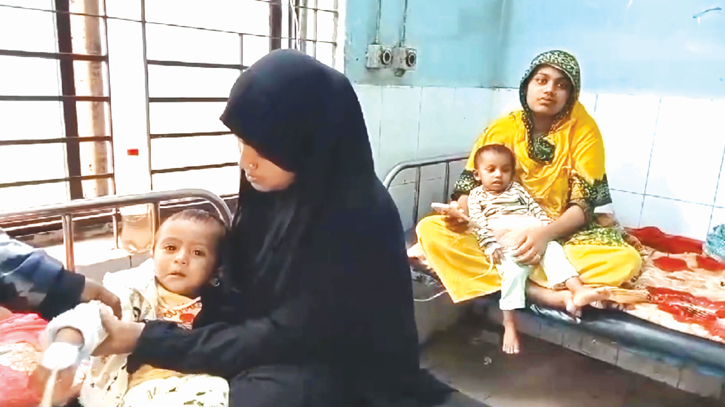
Photo : Messenger
The onset of winter has led to a concerning spike in the number of patients grappling with cold-related illnesses at Gaibandha General Hospital. Simultaneously, individuals with limited financial means find themselves exposed to the harsh cold without adequate warm clothing.
Children and the elderly are particularly vulnerable, bearing the brunt of various winter-related diseases. The hospital is grappling with overwhelming numbers, evident in the admission of 26 patients to the children's ward from Monday to Tuesday morning alone.
The intensifying winter conditions, coupled with fog, have resulted in hospitals teeming with patients, especially those suffering from asthma. Various ailments, including pneumonia, heart problems, asthma, and diarrhea, are afflicting the populace, with children and the elderly being disproportionately affected. Gaibandha General Hospital is experiencing heightened patient pressure in the diarrhea and infant wards.
Over the past week, an alarming 1,741 children and elderly individuals have sought medical attention due to asthma-related illnesses. The pediatric ward, equipped with 20 beds, is stretched beyond capacity, forcing patients to receive treatment on the floor and even on the balcony.
Doctors on the frontline report a steady increase in patients since mid-November. The children's ward has seen a surge in patient admissions, particularly parents bringing in children suffering from pneumonia, bronchitis, shortness of breath, asthma, fever-cold, and diarrhea. Most of the affected children fall in the age group of zero to five years.
Patient pressure has also mounted in the outpatient department, with a notable increase in individuals seeking medical care. Doctors and nurses at Gaibandha General Hospital's children's ward are tirelessly attending to the influx of young patients.
Relatives of patients express concerns, citing instances of persistent diarrhea and vomiting for the past two days. Hospital staff is administering saline solutions, addressing symptoms like repeated defecation and cessation of vomiting.
A hospital nurse commented on the rising admissions, stating that more children are being admitted due to winter-related ailments, and recovery takes an average of 5 to 7 days. However, the limited space in the children's ward poses challenges in providing adequate accommodation.
Dr. Mahbub Hossain, the supervisor at Gaibandha General Hospital, acknowledged the surge in patients attributed to the winter season. Notably, diarrhea cases witnessed a substantial increase, with 34 admissions on the previous day and an additional 26 in the past 24 hours.
While 21 individuals have recovered and returned home, the hospital continues to witness a steady influx of children seeking outpatient treatment. Dr. Hossain emphasized the need for heightened vigilance in caring for children during this critical period.
The escalating number of patients seeking medical attention at Gaibandha General Hospital due to winter-related illnesses is a cause for serious concern. The surge in cases, particularly among vulnerable populations such as children and the elderly, underscores the urgency of addressing the impact of cold weather on public health.
As the winter season persists, health authorities, communities, and policymakers must collaborate to implement preventive measures and provide essential resources to mitigate the impact on public health. Timely interventions, increased awareness, and community support are crucial in ensuring the well-being of those affected by the harsh winter conditions in Gaibandha.
Messenger/Uzzal/Shahin








